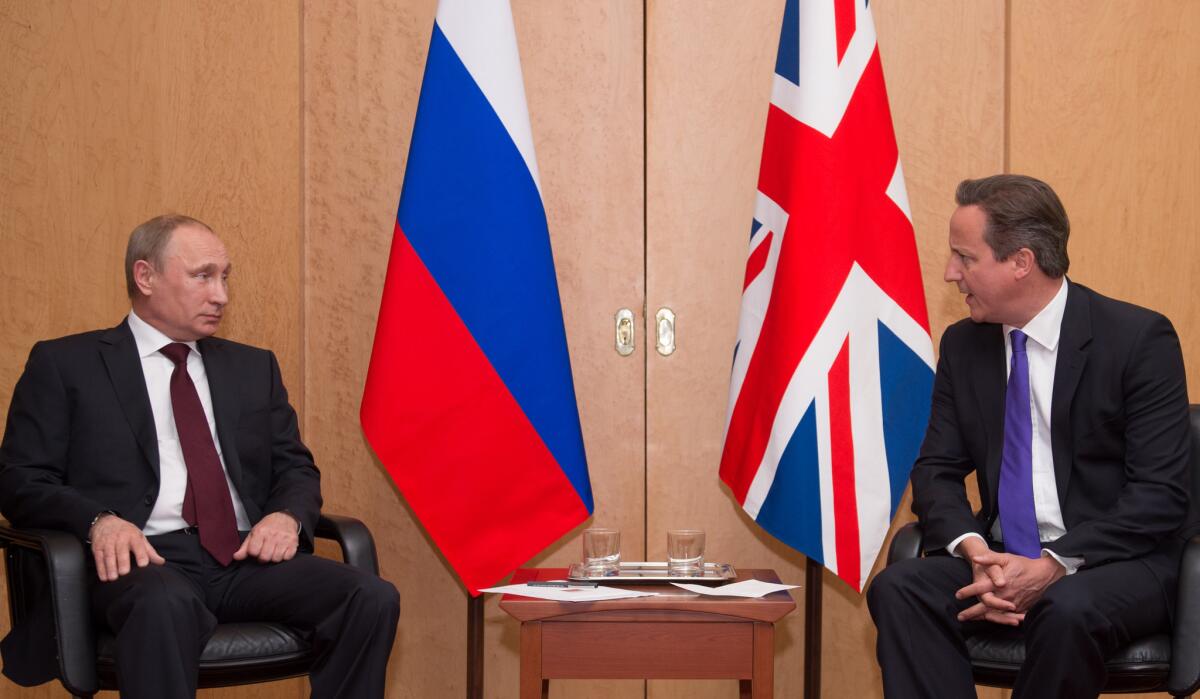Kremlin answers G-7 sanctions threat with carrots and sticks

- Share via
Kremlin officials sent mixed signals Thursday on their intentions in Ukraine, announcing that Russia’s ambassador will return to Kiev for Saturday’s inauguration of President-elect Petro Poroshenko but also
blasting Ukraine’s interim leaders for plans to seal the Russia-Ukraine border.
Deputy Prime Minister Dmitry Rogozin also accused the Ukrainian government of halting delivery of defense supplies and equipment to Russian-occupied Crimea, the heavily militarized Black Sea peninsula seized from Ukraine this year and annexed to Russia.
Moscow authorities also announced a temporary ban on Ukrainian potato imports, claiming food safety concerns over the crop. Last week Russia barred pork imports from Ukraine on the same grounds, imposing a trade barrier perceived by Kiev and its Western allies as a further attempt by Moscow to put pressure on Ukraine’s struggling economy.
The moves follow a warning to Russian President Vladimir Putin delivered by the Group of 7 industrialized nations overnight that his government would be hit with more punishing sanctions unless he showed a sincere effort to defuse the armed confrontations in eastern Ukraine, which Putin is accused of instigating.
The announcement by Russia’s Foreign Ministry that Ambassador Mikhail Zurabov will return to Kiev and attend Poroshenko’s inauguration didn’t make clear whether the gesture was a precursor to official Kremlin recognition of the restoration of legitimate leadership in Ukraine. Poroshenko was elected May 25 in a landslide to succeed Viktor Yanukovich, the Kremlin ally driven from office in February after three months of demonstrations against him.
“Now, after the presidential elections, the decision is taken that he will return to Kiev, return to his duties and will participate in the official ceremony of inauguration of President Petro Poroshenko,” Deputy Foreign Minister Grigory Karasin told Itar-Tass. But the official Russian news agency also quoted an unidentified diplomatic source as saying Zurabov would skip the reception following the swearing-in.
Recognizing Poroshenko as Ukraine’s head of state is the first of three conditions set down by the G-7 leaders in Brussels on Wednesday night that Putin must meet if he wants to avert broader sanctions by the U.S. and European Union.
Unless Moscow accepts the legitimacy of the election, as well as end its support of separatists in eastern Ukraine and cooperate with Kiev in drafting constitutional reforms, Russia will face punitive measures against entire sectors of its economy, the G-7 leaders said.
The United States and the European Union have targeted about 100 individuals in Russia and Ukraine identified as key figures in the seizure of Crimea and the pro-Russia gunmen holding sway over a dozen towns and cities in Ukraine’s Donetsk and Luhansk regions. The threatened next step could hit Russia’s energy, banking and defense sectors, seriously hampering its lucrative oil and gas trade.
The top U.S. and Russian diplomats met in Paris on Thursday and expressed hope for repairing strained relations between the former Cold War rivals by resolving the conflict in Ukraine, which has taken nearly 200 lives.
“This is an opportunity, we hope, for Russia, the United States and others, all to come together in an effort to try to make a Ukraine that is strong economically, whose sovereignty is respected, whose independence is respected but clearly is not a pawn in a tug-of-war between other nations,” U.S. Secretary of State John F. Kerry said.
Russian Foreign Minister Sergei Lavrov said Moscow also wanted to see a peaceful, stable Ukraine, where all who live there are “feeling equal, respected and listened to.”
He was alluding to the Kremlin’s concerns that the linguistic and cultural rights of Ukraine’s ethnic Russian minority -- nearly 1 in 5 of the country’s citizens -- are infringed by Ukrainian nationalists in the western half of the nation.
Lavrov struck a congenial posture at the Paris meeting, part of this week’s international commemoration of the 70th anniversary of the D-Day landings in Normandy that turned the tide of World War II and led to the Allied victory a year later.
But Moscow kept up its denunciation of Ukrainian leaders and their military efforts to roll back the separatists’ territorial seizures in the east.
An announcement by Ukraine’s State Border Guard Service that it was sealing off border crossings in the Luhansk region to prevent further infusions of weapons and insurgents from Russia prompted statements of outrage in Moscow.
“We are indignant with the Ukrainian authorities,” Russian Foreign Ministry spokesman Alexander Lukashevich said, casting Kiev’s plans to close border crossings as an effort to expose the Russian-allied population to a punitive campaign by government troops.
Ukraine has also spurned Moscow’s calls for creation of “humanitarian corridors” to deliver aid to citizens caught up in the fighting between separatists and Ukrainian troops.
Kiev officials fear that any supplies delivered from Russia will bolster the separatists who are creating the danger and instability. Russia insists on a cease-fire and safe passage for civilians wanting to seek refuge in Russia.
Putin, who met with French President Francois Hollande and British Prime Minister David Cameron in Paris ahead of Friday’s D-Day ceremony in Normandy, repeated his denial of any Kremlin hand in the violence in eastern Ukraine in interviews with French news media.
“There are neither military personnel nor Russian instructors in southeastern Ukraine,” Putin told France’s TF1 television and Europe1 radio.
Recalling unfounded U.S. claims that it had evidence of Iraqi dictator Saddam Hussein’s purported chemical weapons arsenal a dozen years ago, Putin said of the Western allegations that he is behind the Ukraine unrest: “Let them present this evidence.”
More to Read
Sign up for Essential California
The most important California stories and recommendations in your inbox every morning.
You may occasionally receive promotional content from the Los Angeles Times.














